Last year my ‘Us And Trees’ series was far too short with very practical hands-on editions. This year I am starting with more towards the ethereal. I was hoping to have both editions published during this week of Ireland’s ‘Tree Week’. But I have been bedbound for several days with the worst virus I have had so far this winter. So my supporting photo collection may not be the best. A bit of a tricky one to write this time too. I trust it will make sense and inspire. Thank you for reading. I will tune this up when I recover, but am eager to publish this during Ireland’s Tree Week.
My first exploration during this feature is trying to understand the word ‘Gaelic’.
This is my bold attempt at discovering and re-visiting what ‘Gaelic’ is ‘talking’ about, and how Gaelic entered into it’s current Celtic identity. This subject has become quite a ‘dangerous’ endless shaggy dog debate online and offline. This is a debate that gets into multiple viewpoints, often including several people assertive to have their understanding take the lead with words like, ‘proof’, ‘facts’, ‘do your research’ and similar in their responses.

There are some people who believe Gaelic may seem like quite a modern word. To refute that, I am fascinated by the approach of former Trinity College Early Languages professor, Damian McManus. I had heard similar interpretations from other sources before reading and hearing what McManus had to say and share. But for me Damian made understanding the Gaelic word very clear.
McManus was fascinated by the ‘bardic’ exchanges between what is now Wales and Ireland, especially Leinster. I came across these stories, in abundance, within a private ‘bards museum’ in Oxfordshire. There was, and is, an incredible collection of medieval texts there owned by a harp maker there. Exchanges between Wales and Ireland were explained, through these old texts, and this included language words.
One of those words was ‘gwyddel’. This is a word that the Welsh, and maybe earlier Britons used too, used as a derogatory word to describe the Irish. At that time the Britons, then Welsh, and we can perhaps include Picts too, were very much into their farming culture, but they regarded the Irish as being ‘wild people among the trees’, especially Alder marshes..
So it is thought that the Welsh etc. word ‘gwyddel’ was used at that time to describe the Irish as ‘wild people among the trees’. The gwyddel word is used in different ways In Wales now
But the Irish, apparently, picked up that ‘gwyddel’ word as being a complimentary description of them. Perhaps this was because they were actually living a woodland and tree culture during those times rather than living a bog and farming culture that happened later?
Within what is now Ireland, the word ‘gwyddel’ became ‘Gaedhil’. Probably one or two the Irish scribes got their heads around hearing the Welsh word, and found letters they knew. It seems that what they were hearing was ‘gwyddel’, but spelled it as ‘Gaedhil’. Eventually the scribes shortened ‘Gaedhil’ to ‘Gael’.
It seems that from the 6th century, probably 7th century, as the 6th century was riddled with epidemics that gave education and the scribing industry huge knocks backwards. But from the 7th century it seems that the ‘Gael’ word changed meaning and focused to become a word to describe those who actually learned to scribe ‘Gael’ and other things.
That’s when Gael evolved from ‘tree people’ to ‘scholars’. A change from people who lived with the trees to scribing on material from the trees. The meaning of ‘Gaelic’ developed into a description of the higher scholarly class, the elite of the time.
McManus claims that at that same time this island became more known as Gael than Érrainn. It seems the scribed Irish language became known as ‘Gaedelg’. Through West Scotland and Islands the language is still known as Gàidhlig, pronounced something like ‘garlig’,

The Welsh also changed their meaning from their derogatory ‘gwyddel’. The word developed into a respectful ‘Gwyddeleg’, to describe that Irish were scholars who scribed language.
A lot of that information I have just shared, so far, is from McManus’ book ‘A Guide To Ogam’ book which is hard to find now, and expensive when you do … and, yes, in his book he explains why the word is ‘ogam’ rather than ‘ogham’.
I mentioned the origins of the word Gaelic describing ‘wild people of the trees’, or maybe ‘people of the trees’. What visions does the thought of ‘people of the trees’ bring up within us?
Various interpretations I can think of are survival from the what we could harvest from trees, living among the trees, and many people today may think of this as ‘connecting with the trees’.
Whatever visions we are prompted with, I think there is also a question of interpreting ‘what is ‘nature’? It seems that many people still believe we are external to this thing we call ‘nature’, and that we need to learn to ‘connect’ with it. These days I try so hard to not say ‘connect with nature’ as saying that is very alien to what I believe.
Even stranger, to me, is any human beings believing that intelligence does not exist within any nonhuman realm, and any thought of that is just new New Age BS.
What may cause that response is maybe our thinking that we are the only animal species that has invented a system of creating written symbols, joining them up, and creating words, sentences, and paragraphs, that we struggle to communicate to other humans with.
Perhaps it is due to our growth in learning to write and read that has also developed our ideas of this thing we call ‘nature’, a word that we can write down, so the written ‘nature’ becomes something we are disengaged from.
I seem to often hear in conversation “we are nature, we are not separate from it at all … but have you read this book that talks about that? …”
I believe that any concepts we carry that disengage us with other species can confuse and restrict our thinking. So here within this and the next Nature Folklore editions I am attempting to write about this.
We do seem to struggle with words when our senses and visions do not fit into the vocabulary of the language we use. I know I do!
I firmly believe that the endless species of living bodies, and the unseen flow of nature, never lacks intelligence. It is our own protected and defended concepts framed by our writings that lack intelligence. Our writings may be full of logic maybe, but our writing does not include the highly intelligent flow of wisdom within it’s visible text. Our imagination may compensate for that though.
I just do not and cannot believe in this thing we call ‘intelligence’ as being the ability to learn, understand, and deal with situations using a crafted skill of reason.”
Sensing tree and plant intelligence’’ needs us to exercise our senses. This shifts our focus from just reading from sight but venture into listening, breathing, touching, and tasting.
When we trust our senses as much as we trust our logical or linear thinking, we find ourselves seemingly crossing bridges. We pass through gateways that pass by and beyond our human symbol based languages into an unseen and nameless flow of life, and we may call that ‘nature’
When approaching a tree, and the plants growing around and near the tree, step beyond what you interpret with your eyes, or even an identification book you may be carrying or, alas, through an app on your mobile phone.
Allow yourself to soften. Allow what is instinctive clairvoyance to interpret how a tree or plant may flow into you or through you. Sythesising senses into our clairvoyant perception is sensory attention to the conditions of where the tree and plants are growing, what their access to light is like, and whether the tree is alone and independent, or is part of a close community with other trees and plants nearby
As people become familiar and comfortable with wordless sensing communication with trees and nearby plants, there is often still some hesitation and our inner superstition question of “Is this just making it all up?”
This can become a haunting question when people sit with trees but do not quite become present with them. Through those situations, our own worded minds do not quite let go to fully enter into the sensory realm. I believe it is very easy to mix our interpretation of what we sense from a tree with logic we may formulate within our mind.
Sensory communication is beyond thinking. It is language through feeling that transforms into sensation. We may translate sensations into vision, and within that realm are still not using words. It’s a sort of dream response.
Sometimes people ask if trees have a brain. Yes, I believe they do, but its the whole tree that is it’s brain, and not a central organ like we have. Our human brains pick up sensations from any part of our body, but I believe a tree picks up sensation and translates it from every part of it’s being, but cannot compose logical interpretations of that.
To me, I believe we need to attempt to learn how to emerge beyond ourselves so that our sensory sensations become primary, and that thinking is secondary.
Our logic seeking minds do sneak up on us very easily. Words tempt us out of sensations. When a tree evokes sensations, and impressions, our minds are eager to tempt us to order those sensations into some kind of labelling, classifying, applying identity, or even a mission statement … and then archiving it.
I receive this reaction from many things I aim to explain. If the listener cannot label what I am saying and put it into a box, apply bullet point list thinking, then what I am saying does not exist and is eliminated from their thoughts.
One thing I love about real folklore is that it refuses to be ordered. If it is ordered and regulated, then I feel it is not really folklore.
I have written this edition to approach this year’s season of Us And Trees series as an attempt to suggest that we do what we can to start to approach trees and plants with full senses before we interpret them with words, like I am doing here. This is also my attempted approach through my ‘Ogham Prompts’ course modules.
I will also be including some editions with ‘hands on’ suggestions backed with statistics, but for now I am focusing on our presence among trees, whether we are alone in silence following our senses and wonder, or with others sharing bits of wisdom, maybe a little foraging, some moments of fun, and some moments of group silence and breathing. And, of course, some tree hugging. :-)
I enjoy the memes I see from time to time that remind us that trees were on this planet long before humans, and trees probably never ever needed us. But as we are here, and they make use of our presence. We may think that we command trees and they serve us with food, fuel, shelter and medicine, as well as essential air, and keep our local water clean as many tree species do.
But, those memes remind us that were are servants to the trees. They provide us with air, shelter, food and comforts, in return for us shitting and pissing by their trunks to feed them. But, sorry, I cannot find at leas one of those memes now when I need them :-)
I will continue this theme of sensory interpretation of trees and woodlands through one more edition probably within a week …
If you would like to join my 'Ogham Prompts' course? 20 optional modules a year, join in from any module any time as this is a cycle course, plus some meet-ups Please consider upgrading to monthly or very discounted annual subscription and get instant access to my 'Ogham Prompts' course modules. Subscribers will also receive enlarged versions of my free postings to include video clips and interviews where possible. I believe more value that a book, though I have books being put together too. All of my 20 Ogham Prompts are now linked up for easy reference in one place … gazetteer

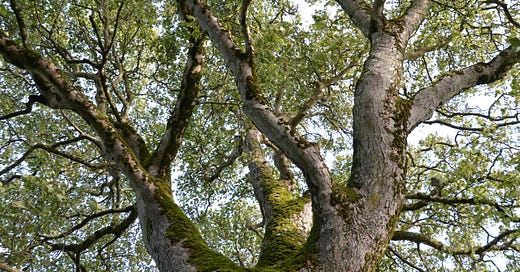


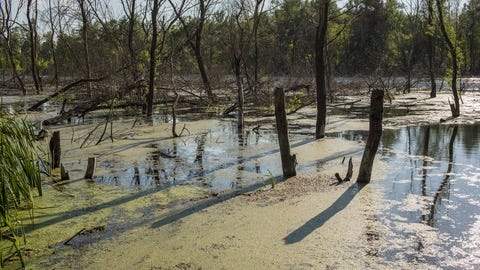
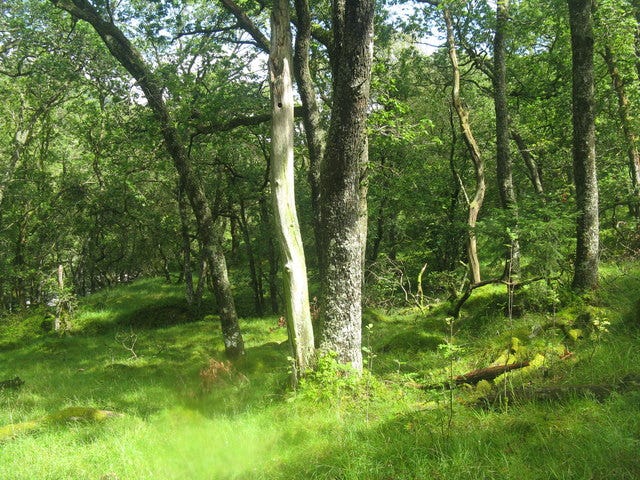


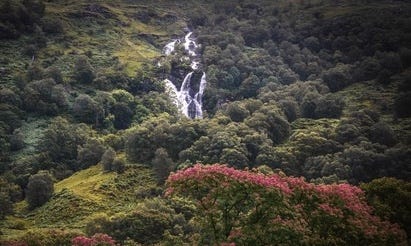



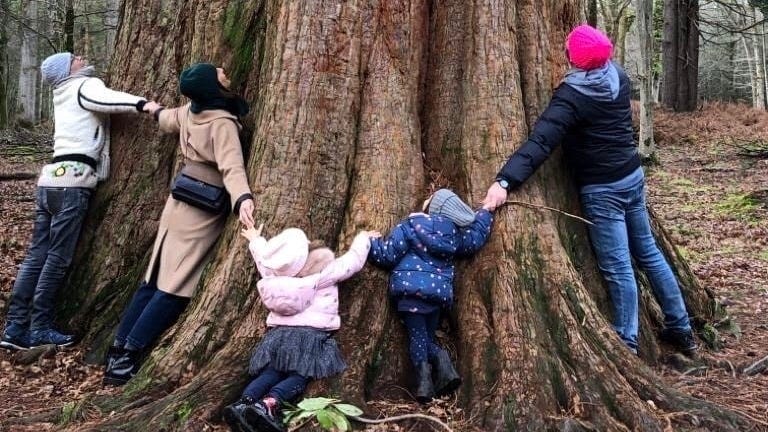
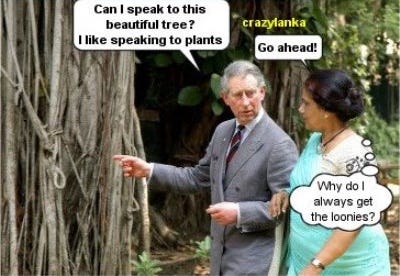
I love that you wrote this!
I enjoyed a little booklet I bought in 1997 called Ogham, An Irish Alphabet by Criostoir Mag Fhearaigh and Tim Stampton. And have studied so much ever since along with the runic systems.
I looked up the McManus you mentioned and found it online through Internet Archive. Thank you. I signed on with a free membership to borrow the book and read it online for an hour.
I hope you will feel better soon!